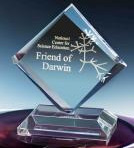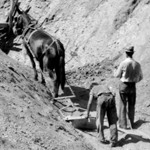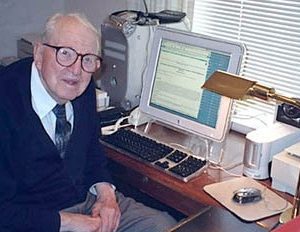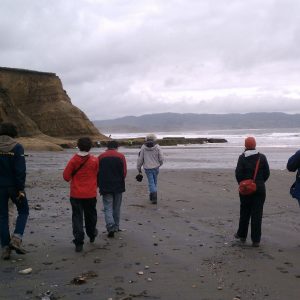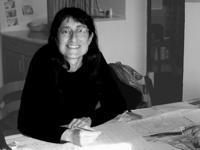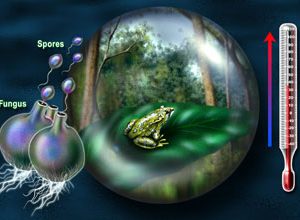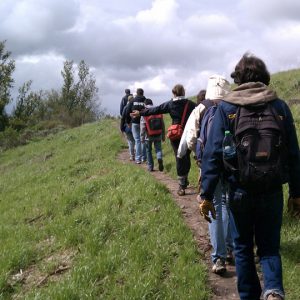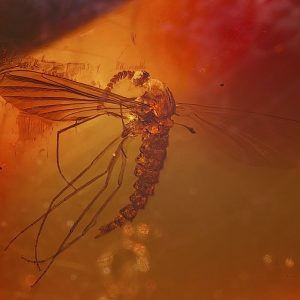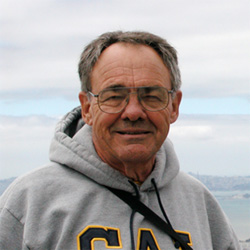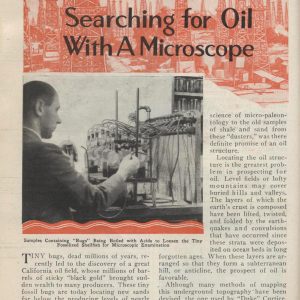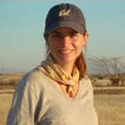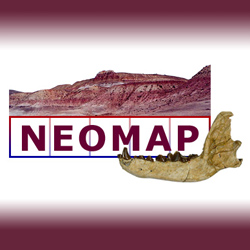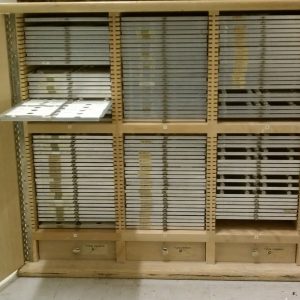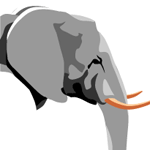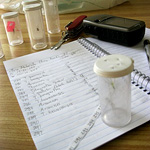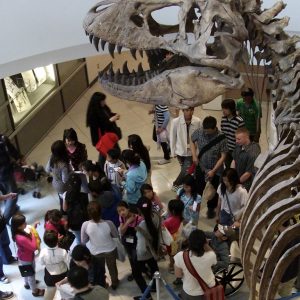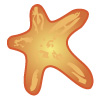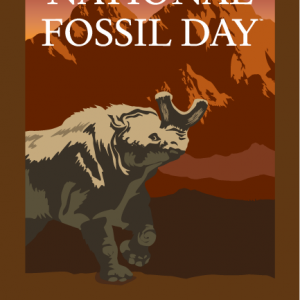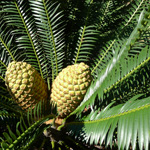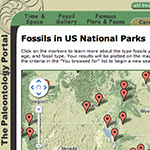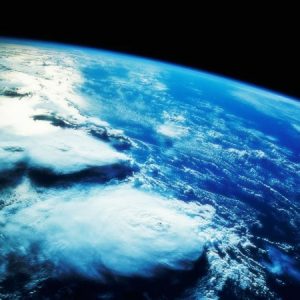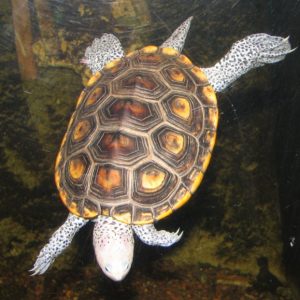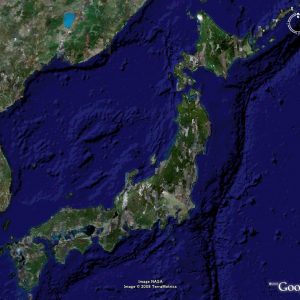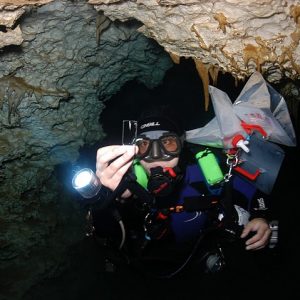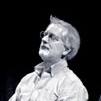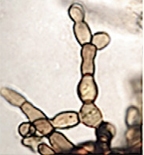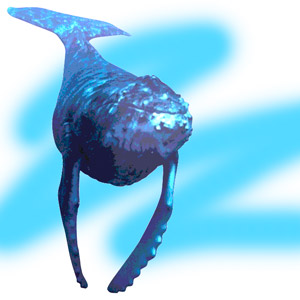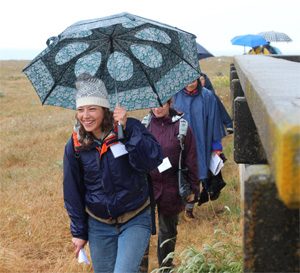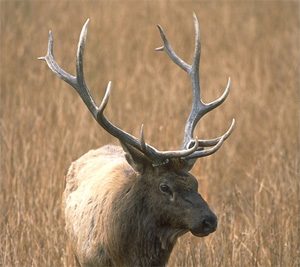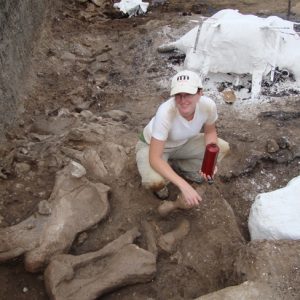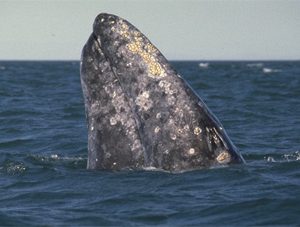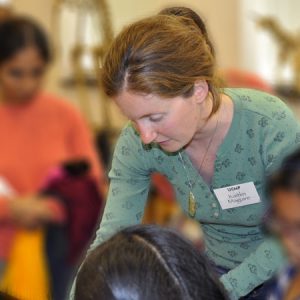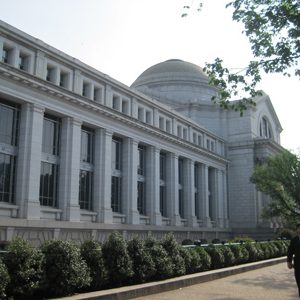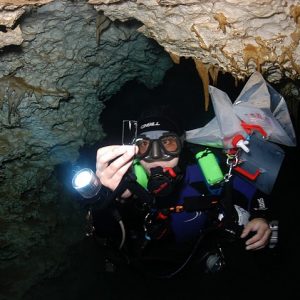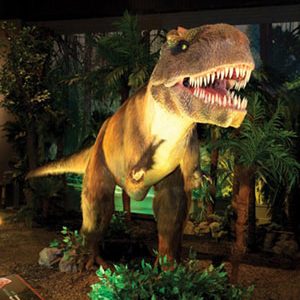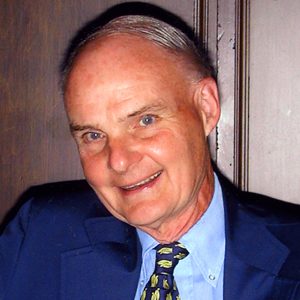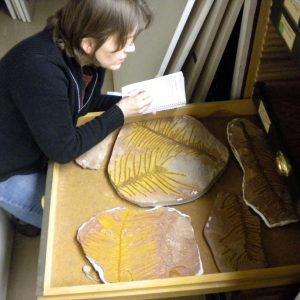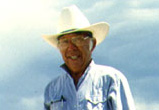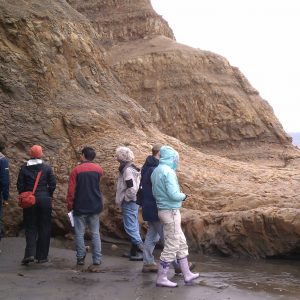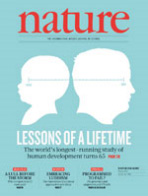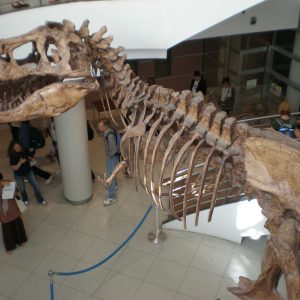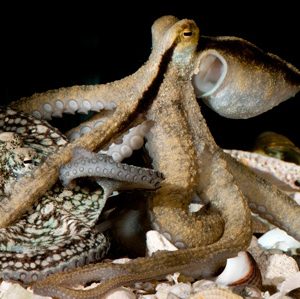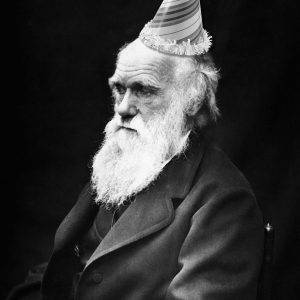The National Center for Science Education (NCSE) has awarded Judy Scotchmoor a Friend of Darwin award for her tireless commitment to evolution education. NCSE explains that the Friend of Darwin award "is presented annually to a select few whose efforts to support NCSE and advance its goal of defending the teaching of evolution in the public schools have been truly outstanding." Read more about Judy, the award, and other Friends of Darwin. … [Read more...] about Judy Scotchmoor receives the Friend of Darwin award
Cataloging the archives: Unearthing a type
This semester, one of the foci of the CLIR/UCMP Archive Project has been cataloging what are called “supplemental locality files.” These files contain materials (other than field notes) that are relevant to UCMP collections, such as polaroid pictures of fossil sites, letters of correspondence involving UCMP scientists, and environmental impact reports for land development proposed in areas with known fossil sites. As such, they are unique records of how collections came to be, and how … [Read more...] about Cataloging the archives: Unearthing a type
UCMP loses a long-time Friend and alum – Nestor John Sander
This morning I was saddened to learn that long-time Friend of UCMP, Nestor John Sander (AKA Sandy) passed away. He was nearly 98. Sandy graduated from Cal with a B.A. in paleontology in 1936 and completed his Masters in 1938. He then joined Standard Oil Company of California and was sent to Saudi Arabia the same year. There he was assigned to map the subsurface contours of a major anticlinal fold that is now the largest oil field in the world, Ghawar. This more than qualified him for an … [Read more...] about UCMP loses a long-time Friend and alum – Nestor John Sander
Bay Area Field Guide: Point Reyes
Point Reyes and the surrounding area in Marin County is a beautiful place to visit and learn about local geology, paleontology, botany and zoology. Marin County contains large outcrops of the Franciscan Complex rocks. These rocks, mostly Cretaceous in age, are a mélange of rocks that originated to the west and accreted to the California coast as the Pacific Plate subducted beneath the North American Plate. The Franciscan Complex includes metamorphics, chert, greywacke, shale and pillow basalts. … [Read more...] about Bay Area Field Guide: Point Reyes
Understanding Evolution and Understanding Science February updates
The UCMP's Understanding Evolution and Understanding Science websites have been updated for February with the following features: Evo in the News: Hybrid sharks aren't "trying" to adapt on Understanding Evolution examines the recent discovery of hybrid sharks near Australia and misconceptions about the discovery's meaning. Cells within cells: An extraordinary claim with extraordinary evidence on Understanding Science shows how an unlikely idea — that the merging of cells played a prominent … [Read more...] about Understanding Evolution and Understanding Science February updates
Paleo-cartoonist Hannah Bonner visits Berkeley
Writer and illustrator Hannah Bonner paid a visit to Berkeley on January 11 to discuss the scientific and creative processes behind her series of paleontology books for children. Born in and based out of Mallorca, Spain, Bonner received a degree in art and has since worked primarily as a freelance artist and illustrator. Her credits include creating artwork for Scholastic, WGBH, and the Smithsonian Institute. At the latter she met her UCMP host, Cindy Looy, who, along with Ivo Duijnstee, … [Read more...] about Paleo-cartoonist Hannah Bonner visits Berkeley
UCMP authors make NSF’s 2011 “Hit Parade”
The work that resulted in the Nature paper "Has the Earth's sixth mass extinction already arrived?" came in at #3 on a list of the year's top news and discoveries from NSF-supported research, as measured by NSF web visitor statistics. The paper's UCMP co-authors include Tony Barnosky, Susumu Tomiya, Brian Swartz, Charles Marshall, Emily Lindsey, Kaitlin Maguire, and Elizabeth A. Ferrer. See the complete NSF "hit parade." Read a PDF of the Nature paper. … [Read more...] about UCMP authors make NSF’s 2011 “Hit Parade”
Bay Area Field Guide: Tilden Park
I think it took us all by surprise to learn that Tilden Park contains several fossil localities and has a rich history with the UCMP. Don Savage, a former professor of paleontology and past chair of the Department of Paleontology at Cal, found a gomphothere jaw by Inspiration Point off Nimitz Way in 1961 and John C. Merriam collected the type specimen of Eucastor lecontei from deposits near Vomer Peak. Underlying the beautiful rolling hills of the park are terrestrial deposits of the Miocene. … [Read more...] about Bay Area Field Guide: Tilden Park
The Amber Files: Words from the University Explorer
"More than 300 years ago, Sir Francis Bacon spoke of amber as 'a more than royal tomb' for tiny insects. Twentieth century scientists may quite agree." But how do insects end up as amber fossils? What else is found in amber? How are these amber fossils prepared for study? The answers to these questions can be found in one of the hidden collections of UCMP's archives — the 1561st broadcast of "The University Explorer." This show was narrated by Hale Sparks, former head of broadcasting … [Read more...] about The Amber Files: Words from the University Explorer
Jere Lipps appointed as Director of The Cooper Center in Orange County
Becoming emeritus usually means an opportunity to slow things down a bit, but that has certainly not been the case for UCMP curators Jim Valentine, Bill Clemens, or Carole Hickman by any means. But starting a new job? Well, welcome to "retirement" defined by Jere Lipps! Jere has just accepted the position of Director of Orange County's John D. Cooper Center for Archaeological and Paleontological Curation and Research. The Cooper Center is a partnership between O.C. Parks and California State … [Read more...] about Jere Lipps appointed as Director of The Cooper Center in Orange County
Relicts of the Bug-men
What are bug-men and how did their existence benefit UCMP? Watch and listen to this slideshow about an obscure link recently discovered by UCMP micropaleontologist Ken Finger. Click cover page below to download the full article. … [Read more...] about Relicts of the Bug-men
Leslea Hlusko one of eleven UC Berkeley faculty named as AAAS Fellows
Congratulations to Leslea Hlusko, UCMP curator and Professor of Integrative Biology, on her selection as a 2011 Fellow of the American Association for the Advancement of Science (AAAS). Leslea received this recognition for her distinguished contributions to the study of primate evolutionary biology, especially in relation to the integration of genetics and the fossil record. The list of fellows, released Tuesday, Dec. 6, by the AAAS, will appear in the Dec. 23 issue of Science. For more on … [Read more...] about Leslea Hlusko one of eleven UC Berkeley faculty named as AAAS Fellows
NeoMap: An important step toward answering macro-scale questions
In science we are often confined to studying processes that occur on local scales. This is a natural place to begin and there is great value in understanding local events and processes, but the ultimate goal, at least in my mind, is to synthesize all these smaller snapshots of how living things interact and respond to their environments into a cohesive, whole-world portrait. This kind of comprehensive understanding is particularly important in light of global climate change, which demands that … [Read more...] about NeoMap: An important step toward answering macro-scale questions
The Amber Files
Unbeknownst to some, UCMP is home to a large collection of amber-encased insect specimens. While some of the most famous amber fossils come from the region south of the Baltic Sea, the majority of UCMP’s amber collection hails from the Chiapas region of Mexico, illuminating never before captured environments of the Western Hemisphere. Spanning nearly two decades from the mid-1950s through the 1970s, efforts to collect and study these specimens were spearheaded through collaboration between the … [Read more...] about The Amber Files
The Proboscidea are here!
Grad student Kaitlin Maguire has researched and written a new feature on the Proboscidea — elephants and their relatives — for the UCMP website. This endeavor grew out of her recent work as a consultant on a 2011 exhibit at the San Jose Children's Discovery Museum. The exhibit focused on Lupé, the mammoth whose bones were discovered along the Guadalupe River in 2005. UCMP staff and students excavated the bones soon after the discovery. Kaitlin's primary research interest is in "… understanding … [Read more...] about The Proboscidea are here!
The eternal value of Natural History and the dazzling molecular promise
The advent of highly efficient and low cost sequencing techniques along with increased computing power have been important catalysts for the massive generation of genomic data (Davey et al., 2011). In parallel have come studies of gene expression and regulation, each of which has earned its own field such as "trancriptomics," "proteomics," "metabolomics," etc. (Zhou et al., 2011). In addition, the combination of these disciplines with ideas associated with graph theory has produced a new area of … [Read more...] about The eternal value of Natural History and the dazzling molecular promise
Cal Day 2011 Highlights!
Interested in learning more about fossils and what they can tell us about the history of life and how they inform our understanding of biodiversity and climate change? Well you're in luck! Just join us for Cal Day! Every April the UCMP and the entire campus is open to the public to engage with UC Berkeley's ongoing research. Check out the events during the 2011 Cal Day in the video below and be inspired to join us next year, April 21, 2012! … [Read more...] about Cal Day 2011 Highlights!
UCMP at the Bay Area Science Festival
UCMP joined the other Berkeley Natural History Museums, the Space Science Lab, Departments of Physics and Chemistry, SynBERG, nanotechnology experts, and a host of other science units as part of the campus-wide participation in the first annual Bay Area Science Festival – a 10 day celebration of science extending from San Jose to Santa Rosa! Dave Lindberg gave a great talk on The History of Kelp Forests: Global and Local Surprises at the November East Bay Science Café and Rosemary Romero … [Read more...] about UCMP at the Bay Area Science Festival
UCMP at the 71st Annual Meeting of the Society of Vertebrate Paleontology
The 71st Annual Meeting of the Society of Vertebrate Paleontology took place November 2-5 in the Paris Las Vegas Hotel on the dazzling Vegas strip, and UCMP's usual presence was as strong as ever. At least 18 Berkeley faculty, staff, graduate students, and undergraduates presented talks or contributed to posters highlighting the range of work UCMP and affiliates accomplish, from bird development to biogeography, ecosystem conservation to dinosaur histology. In case you missed out on all the … [Read more...] about UCMP at the 71st Annual Meeting of the Society of Vertebrate Paleontology
COPUS receives a gift of $35,000 from The Whitman Institute
The Coalition for the Public Understanding of Science (COPUS) is a grassroots network that connects individuals who are passionate about advancing the public understanding of science. In existence since 2006 and responsible for the highly successful Year of Science 2009, COPUS is now focusing on expanding its community for science by promoting dialogue, building connections, and sharing ideas and resources. The Coalition leadership team (the COPUS Core) is holding a science communication and … [Read more...] about COPUS receives a gift of $35,000 from The Whitman Institute
A Walk Through California’s National and State Parks
Wednesday, October 12, 2011, was this year's National Fossil Day and if you missed the festivities, you can still celebrate our Earth's natural history by visiting your local, national, or state parks. To learn more about fossils and the UCMP, check out the East Bay Science Cafe next Wednesday, November 2, when UCMP's Dave Lindberg will talk about "The History of Kelp Forests: Global and Local Surprises." You can also hear from UCMP graduate students, Jenna Judge and Rosemary Romero, at … [Read more...] about A Walk Through California’s National and State Parks
Cycads: Not the “living fossils” that we thought
Palm-like cycads have been around since the last dinosaurs munched on them 65.5 million years ago, but those that we see today are really only a few million years old, according to a new study by an international team of scientists. “Cycads are poster-child living fossils, yet the living species are really young,” reports UCMP Director and Professor of Integrative Biology Charles Marshall, co-author of the study appearing online October 20 (in advance of publication) in Science. “So, while the … [Read more...] about Cycads: Not the “living fossils” that we thought
Observing Earth Science Week and National Fossil Day
UCMP and The Paleontology Portal are proud to observe this year's Earth Science Week (October 9-15) and second annual National Fossil Day (October 12) by (1) launching an interactive map of National Park Service (NPS) areas that preserve fossils; (2) presenting an East Bay Science Café talk; and (3) sharing Bay Area fossils with the public in the upcoming Bay Area Science Festival. 1. Launching a new interactive map The mission of National Fossil Day, hosted by the NPS and the American … [Read more...] about Observing Earth Science Week and National Fossil Day
Berkeley Initiative awarded $2.5 million from Moore Foundation
The Berkeley Initiative in Global Change Biology (BiGCB) was recently awarded a $2.5 million dollar grant by the Gordon and Betty Moore Foundation. The grant funds seven major projects and involves the participation of faculty members in eight departments and four of the Berkeley Natural History Museums on Berkeley's campus, including UCMP and IB faculty Cindy Looy, Tony Barnosky, and Charles Marshall. Projects focus on using novel methods to understand the past, present, and future of the … [Read more...] about Berkeley Initiative awarded $2.5 million from Moore Foundation
Who Ever Said Turtles Were Slow?
Turtles have been around for hundreds of millions of years, but it turns out most North American turtles we see today are new to the block. Museum scientist Pat Holroyd and retired paleontologist Howard Hutchison have been exploring UCMP's vast collection of fossil turtles from Wyoming in hopes of tackling the little addressed question of how turtles and other aquatic reptiles respond to changing climates. These fossils have managed to tell the story of several ancient takeovers back in the … [Read more...] about Who Ever Said Turtles Were Slow?
Student Spotlight: Jenna Judge travels to Japan in search of deep sea snails
Congratulation to UCMP's Jenna Judge who was awarded a spot in the NSF East Asia and Pacific Summer Institutes (EAPSI) last spring. NSF EAPSI provides funding for a graduate student to spend a summer in an East Asian or Pacific country to conduct scientific research as well as engage in societal and cultural practices. Jenna spent her summer in Japan, studying the evolutionary history and ecology of a group of limpets that live in a variety of habitats in the deep sea! Check out her adventures … [Read more...] about Student Spotlight: Jenna Judge travels to Japan in search of deep sea snails
One fossil locality, eight days, 513 rocks, 757 photographs and thousands of plant fossils
This summer we headed to the Italian Alps to work on fossils from a newly discovered Late Permian plant locality in the incredibly scenic Bletterbach gorge. This research is part of a larger project, which tries to quantify the hits that the terrestrial ecosystem took during the end-Permian world-wide biotic crisis. Back in those days Europe and North America were connected and part of one and the same floral realm, not surprisingly called Euramerica. Euramerica was tropical and semi-arid, and … [Read more...] about One fossil locality, eight days, 513 rocks, 757 photographs and thousands of plant fossils
Student Spotlight: Joey Pakes 2010 Diving Expedition for Remipedes in the Yucatan
Imagine what it would be like: swimming in the dark, deep underwater, in an enclosed space, “armed” with only a flashlight and a tank of air. For UCMP graduate student Joey Pakes, that is a typical day of research in the subterranean caves in Mexico. Check out her video which describes her 2010 expedition to the Yucatan Peninsula as part of her ongoing investigations into underwater cave systems. Meet some of the people and animals that make her research so … [Read more...] about Student Spotlight: Joey Pakes 2010 Diving Expedition for Remipedes in the Yucatan
125,000 years of geologic change in SF Bay, not much change in the microfauna
San Francisco Bay has had a dynamic and complex history over the past million years as sea level rose and fell at least four times with alternating warming periods and glaciations. About 13,000 years ago, the first group of humans arriving in the area would have walked through a valley with a river flowing nearly 48 km out toward the ocean. The current bay formed only about 6,000 years ago. In a recent paper published by Quaternary Research, Amy Lesen, former PhD student in UCMP and currently … [Read more...] about 125,000 years of geologic change in SF Bay, not much change in the microfauna
Congratulations to Mark Terry
Mark Terry, a long time Teacher Advisor to UCMP, is the recipient of the 2011 Evolution Education Award, an annual award sponsored by AIBS and BSCS. Mark is a high school Biology teacher at The Northwest School in Seattle. I first met Mark in 2000 when he sent an email inquiring about a conference that we were hosting — The National Conference on the Teaching of Evolution. The conference served to bring together members from professional societies to examine what their roles might be in … [Read more...] about Congratulations to Mark Terry
Pathogenic fungi: Conifer killers?
At the end-Permian extinction event 250 million years ago, 70% of land organisms and 95% of marine organisms went extinct. Forests of conifer relatives were also wiped out … and their demise may have been helped by pathogenic soil fungi suggest UCMP's Cindy Looy and colleagues Henk Visscher, Utrecht University, Netherlands, and Mark Sephton, Imperial College, London. Most researchers accept that extensive volcanism at the end of the period, resulting in major changes in global climate, … [Read more...] about Pathogenic fungi: Conifer killers?
Marine Mammal 2011 short course revisited
Attendees of UCMP short courses always go away with new understandings of the world around them and its history. Rather than presenting simple reviews of the basics, short course speakers present up-to-date overviews of topics and share both their current knowledge and the excitement of their science with the audience. However, those in attendance at last March’s Marine Mammal short course probably did not realize that they were actually getting a sneak preview of forthcoming research … [Read more...] about Marine Mammal 2011 short course revisited
CAL:BLAST at Bodega Bay, June 28-29, 2011
Despite a fluke June rainstorm, grad students managed to keep spirits high during two days of field work at Bodega Bay. Just as the rain began to fall, each of the graduate students — Jenny Jacobs, Misha Leong, Joey Pakes, and Rosemary Romero — welcomed 37 elementary school teachers and took them in groups of ~10 on a preliminary tour of the Bodega Marine Reserve (BMR). This would serve as an initial orientation to the buildings and the different coastal habitats that would be their focus area … [Read more...] about CAL:BLAST at Bodega Bay, June 28-29, 2011
How mammals got their horns (and other headgear)
UCMP's Katherine Brakora and UCMP alums Edward Davis (now at University of Oregon) and Andrew Lee (now at Midwestern University) reviewed the evolution of mammal headgear in the latest edition of Proceedings of the Royal Society B. They examined phylogeny, development and fossil histology to establish a clearer picture of the evolution of these cranial appendages. This work has biomedical implications as well — understanding fast-growing antler bone may help with treating burns, bone cancer, … [Read more...] about How mammals got their horns (and other headgear)
Student Spotlight: Emily Lindsey and the late Pleistocene megafauna in South America
This post's text is also available in Spanish. Congratulations to graduate student Emily Lindsey, this year's recipient of the George D. Louderback Award! Emily has been hard at work the past few years investigating the timing, dynamics, and key players behind the late Pleistocene extinction of megafauna in South America. Like the famous La Brea Tar Pits in Los Angeles, California, Emily's excavation site on the Santa Elena Peninsula in Ecuador is an asphalt seep preserving the remains of a … [Read more...] about Student Spotlight: Emily Lindsey and the late Pleistocene megafauna in South America
Gray whales are survivors
UCMP's David Lindberg and the Smithsonian's Nicholas Pyenson determined how many gray whales could be supported by the ocean through periods of global cooling and warming. Their results, published in the latest edition of PLoS ONE, show that in the past 120,000 years gray whales survived periods when their feeding grounds were greatly-reduced due to glaciation. The authors propose that gray whales were able to survive the lean times by diversifying their feeding habits, a behavior that has been … [Read more...] about Gray whales are survivors
KQED Quest features Kaitlin Maguire and Lupe the mammoth!
Considering a visit to the new mammoth exhibition at the Children’s Discovery Museum of San Jose? UCMP graduate student Kaitlin Maguire provides a sneak preview of the exhibits in this Science on the SPOT video produced by KQED. Listen in as she discusses the 2005 mammoth discovery in San Jose and what the fossils can tell us. … [Read more...] about KQED Quest features Kaitlin Maguire and Lupe the mammoth!
Molly Wright’s Trip to the Smithsonian Collection
DAY 1 (5/17/2011): I work with Professor Roy Caldwell to study the evolution of the behaviors and morphology of mantis shrimps – pugnacious crustaceans that are distant cousins to lobsters, true shrimps, and crabs. Mantis shrimps use fearsome raptorial appendages to smash or spear their prey. Even more surprisingly, some mantis shrimps live in male-female pairs in sandy burrows, with both sexes caring for the young and sharing food. Social monogamy, when a single male and female live as a pair … [Read more...] about Molly Wright’s Trip to the Smithsonian Collection
Joey Pakes – A Chang-Lien Tien Scholar!
Roy Caldwell was delighted to receive word yesterday morning from the Selection Committee of the Chang-Lin Tien Scholars in Environmental Sciences and Biodiversity that they had approved the nomination for Joey Pakes as a Tien Scholars Graduate Fellowship recipient! The amount of $21,000 will be awarded to Joey for tuition, fees and/or stipend for the 2011/2012 academic year. This is a one-year award with the possibility of a 2nd year of funding based on research progress and … [Read more...] about Joey Pakes – A Chang-Lien Tien Scholar!
“Dinosaurs Unearthed” at the Lawrence Hall of Science
Looking for a fun summer activity? Interested in learning about dinosaurs? Well you’re in luck! Now through January 1st, the Lawrence Hall of Science is featuring a new exhibit titled “Dinosaurs unearthed.” The exhibit includes life-size replicas of some of the most well known dinosaurs including T. rex, Triceratops, and Stegosaurus. You also get to dig for your own fossils while looking at the bones of dinosaurs discovered by UCMP scientists. The younger folk, ages 2-7, will also have fun … [Read more...] about “Dinosaurs Unearthed” at the Lawrence Hall of Science
Paleontologist and sustainability advocate Bill Berry dies at 79
Paleontologist William B. N. Berry was a world expert on extinct, 400 million-year-old sea creatures, but he will be perhaps best remembered in the Bay Area as a champion of sustainability and for instilling in his students a concern for the local ecology. A former director of UC Berkeley’s Museum of Paleontology and a professor of earth and planetary science who served the campus for 53 years, Berry died May 20 of skin cancer and related complications. He was 79. Berry encouraged his students … [Read more...] about Paleontologist and sustainability advocate Bill Berry dies at 79
“Field Notes”: Devonian liverworts and Permian conifers
On a cold Berkeley morning late in March paleobotanist Cindy Looy and grad student Susan Tremblay hopped on a plane to Washington DC. Their goal was not to enjoy the gorgeous spring weather and peaking cherry blossoms, but instead to search for clues to the early evolution of plants in the collections of the National Museum of Natural History (NMNH). Devonian liverworts and Permian conifers were on the menu. Pallaviciniites devonicus, described by Francis Hueber in 1961, is one of the oldest … [Read more...] about “Field Notes”: Devonian liverworts and Permian conifers
UCMP associate Harley Garbani dies at 88
We are sad to report the death of longtime UCMP associate Harley Garbani. Garbani collected T. rex and Triceratops specimens and many others. Read his complete Los Angeles Times obituary to find out more about his wonderful career and association with UCMP. … [Read more...] about UCMP associate Harley Garbani dies at 88
UCMP’s award-winning students
David Hurt, who is co-advised by Jonathan Stillman and David R. Lindberg, has been awarded a National Science Foundation Graduate Research Fellowship. David started as a Ph.D. student Berkeley in 2010, and is examining potential effects of ocean acidification on the physiology and behavior of porcelain crabs during their development. For more about David, enjoy his audio slide show. Allison Stegner, who is advised by Tony Barnosky, has also been awarded a National Science Foundation Graduate … [Read more...] about UCMP’s award-winning students
Cal Day 2011 is here!
It's that time of year we've all been waiting for: Cal Day! This Saturday marks the one day a year UCMP opens its doors to the public and plays host to a number of events aimed to expose all those who are interested to the fascinating world of fossils. Stop by the Valley Life Sciences Building for festivities that range from digging for bones to learning about climate change. Found a fossil you need identified? Our experts have set up shop to help you out with just that. Don't forget to … [Read more...] about Cal Day 2011 is here!
UCMP’s Spring Break in the Bay Area
It's a spring break tradition here at UCMP to organize a trip exploring the geology and paleontology of a particular region. In the past, students and faculty have traveled to places like Oregon and Baja. But why run off when there's so much to see in our own backyards? In a series of trips to nearby parks, Integrative Biology graduates, undergraduates, faculty, and affiliates literally got their feet wet trekking across the product of the Bay Area's complex geologic history. From UC … [Read more...] about UCMP’s Spring Break in the Bay Area
UCMP authors write about extinction in Nature
The latest edition of the journal Nature includes a paper authored by Tony Barnosky entitled "Has the Earth's sixth mass extinction already arrived?" Co-authors include UCMP's Susumu Tomiya, Brian Swartz, Tiago Quental, Charles Marshall, Jenny McGuire, Emily Lindsey, Kaitlin Maguire, Elizabeth Ferrer and the Integrative Biology department's Nicholas Matzke, Guinevere Wogan and Ben Mersey. They used new paleontological information to make an apples-to-apples comparison between current … [Read more...] about UCMP authors write about extinction in Nature
The Opportunistic T. rex
Looks like the tyrant lizard wasn't so scary after all. UCMP's Mark Goodwin and Jack Horner, curator of paleontology at the Museum of the Rockies, have been working in the late Cretaceous Hell Creek Formation of Eastern Montana for decades, an area famous for its impressive fossil assemblages including fish, mammals, and dinosaurs like Tyrannosaurus rex. Based on a census of predator and prey found at several of the time intervals represented in the Hell Creek Formation, Goodwin and Horner … [Read more...] about The Opportunistic T. rex
Happy Valentine’s Day from the Caldwell Lab
Love is in the water, and UCMP's Roy Caldwell has the photos to prove it! The cephalopod resource website TONMO has posted a sequence of Roy's crystal-clear photos depicting a pair of mating Abdopus aculeatus octopuses. Readers can follow this relationship from the first, tentative moments of courtship through to a brood of adorable octopus eggs. Click through to TONMO for the photo essay and accompanying commentary. … [Read more...] about Happy Valentine’s Day from the Caldwell Lab
Happy Birthday, Darwin!
Our old buddy Charles Darwin turns 202 this Saturday and the Berkeley Natural History Museums aren't letting him forget it. In addition to a Darwin-inspired photo contest, the Essig Museum of Entomology, on behalf of the Entomology Student Organization, will be giving several tours of their new museum space on Friday before a birthday party complete with photo judging and, you guessed it, cake! To find out more about how people across the world are celebrating Darwin Day, check out the … [Read more...] about Happy Birthday, Darwin!
